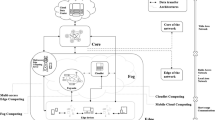Abstract
Open Service Gateway initiative (OSGi) platforms integrate a variety of reusable applications and resources, packing them into bundles. These deployed services, which are offered by service providers, can expediently manage home appliances. However, in the user’s daily life, various services or bundles access to other services directly or indirectly, creating a situation that is likely to generate problems involving non-supportable applications or insufficient hardware resources. OSGi platforms are no way to deal with these situations. Although much research has proposed methods to resolve specific issues, almost all of these methods are incomplete or are unsuitable for the limited resources in households. This paper addresses the wide range of such common home-network applications as those involving health care, home automation, and home security; and both our proposed priority-based principles of a management decision-making mechanism and our framework architecture help ensure the quality of service and or emergency responses.
Similar content being viewed by others
References
OSGi Alliance [Online]. Available http://www.osgi.org.
Meliones, A., Economou, D., Grammatikakis, I., Kameas, A., & Goumopoulos, C. (2008). A context aware connected home platform for pervasive applications. In IEEE international conference on self-adaptive and self-organizing systems workshops (SASOW), Oct. 2008.
Bottaro, A., Simon, E., Seyvoz, S., & Gérodolle, A. (2008). Dynamic web services on a home service platform. In 22nd International conference on advanced information networking and applications, March 2008.
Lin, W.-W., & Sheng, Y.-H. (2008). Using OSGi UPnP and Zigbee to provide a wireless ubiquitous home healthcare environment. In The second international conference on mobile ubiquitous computing, systems, services and technologies, Oct. 2008.
Lin, R.-T., Hsu, C.-S., Chun, T. Y., & Cheng, S.-T. (2008). OSGi-based smart home architecture for heterogeneous network. In 3rd international conference on sensing technology (ICST), Dec. 2008.
Uhm, Y., Hwang, Z., Lee, M., Kim, Y., Kim, G., & Park, S. (2007). A context-aware dynamic service-oriented system for reconstructing adaptive services by the management of rule and ontology. In International conference on convergence information technology, Nov. 2007.
SOA & OSGi [Online]. Available http://www.osgi.org/blog/2007/09/soa-osgi.html.
Kang, K., Lee, J., & Choi, H. (2008). Using management markup language for remote control of OSGi-based home server. IEEE Transactions on Consumer Electronics, 54(4), Nov. 2008.
Cho, E.-A., Moon, C.-J., & Baik, D.-K. (2008). Home gateway operating model using reference monitor for enhanced user comfort and privacy. IEEE Transactions on Consumer Electronics, 54(2), May 2008.
Kang, K., Lee, J., & Choi, H. (2006). Management system for OSGi-based infrastructure. In Consumer electronics, ICCE, digest of technical papers, Jan. 2006.
OSGi Alliance. (2005). OSGi service platform core specification release 4. October 2005.
OSGi alliance [Online]. Available http://www.osgi.org/javadoc/r4v41/org/osgi/framework/ServiceRegistration.html.
Silberschatz, A., Galvin, P. B., & Gagne, G. (2004). Scheduling algorithms. In Operating system concepts (7th ed.). USA: Wiley.
da Silva, A. R. V., & Ochi, L. S. (2007). A hybrid evolutionary algorithm for the dynamic resource constrained task scheduling problem. In Parallel and distributed processing symposium, March 2007.
Yang C.-s., Lu Y.-C., Liao M.-Y., Chen C.-X. (2011) Design and implementation of HEMS based on RFID and OSGi. Wireless Personal Communications 59(1): 73–83
Cheng S.-T., Wang C.-H. (2012) An adaptive scenario-based reasoning system across smart houses. Wireless Personal Communications 64(2): 287–304
Author information
Authors and Affiliations
Corresponding author
Rights and permissions
About this article
Cite this article
Cheng, ST., Chou, CL. & Horng, GJ. Priority-Oriented Architecture Service Management on OSGi Home-service Platform. Wireless Pers Commun 71, 611–628 (2013). https://doi.org/10.1007/s11277-012-0833-x
Published:
Issue Date:
DOI: https://doi.org/10.1007/s11277-012-0833-x




